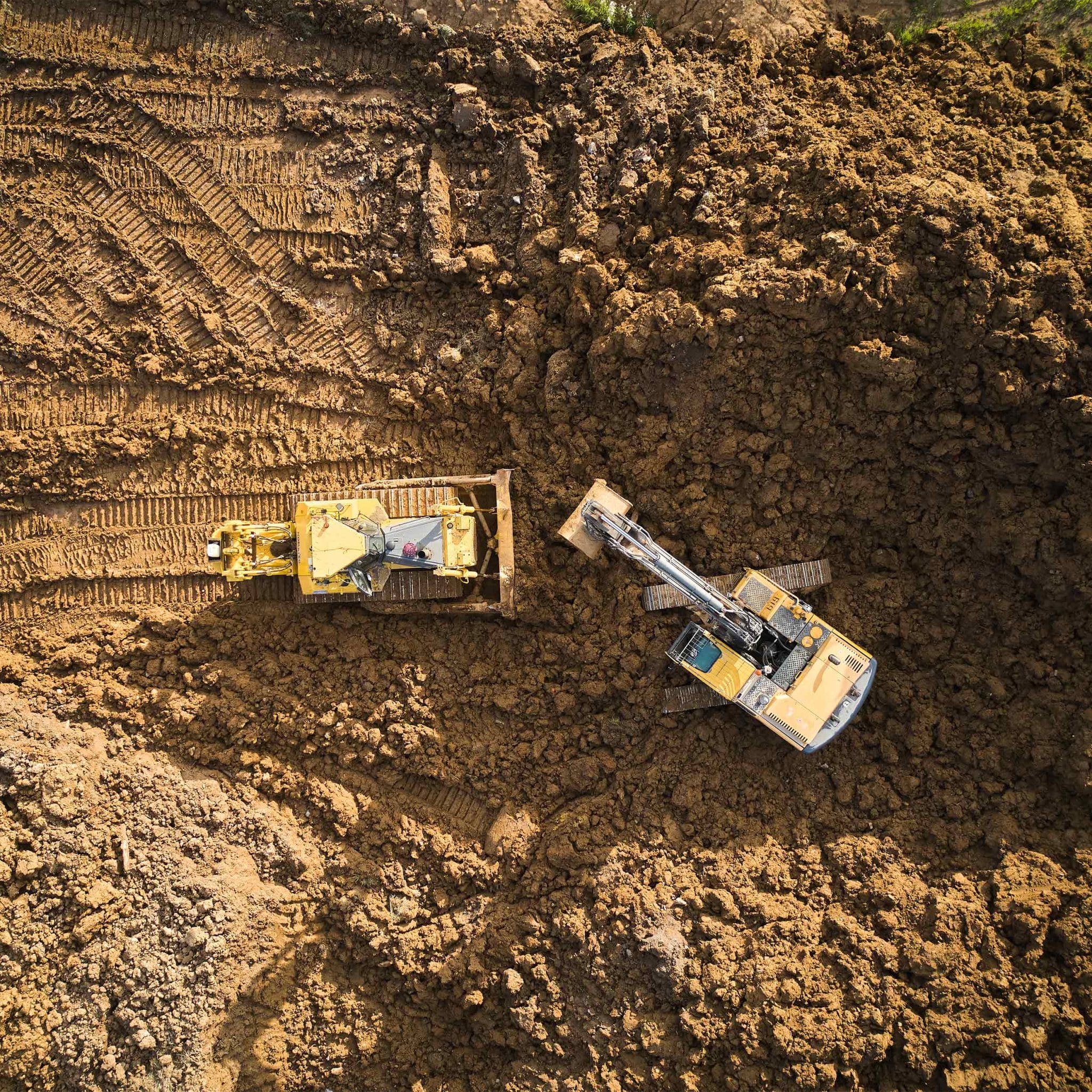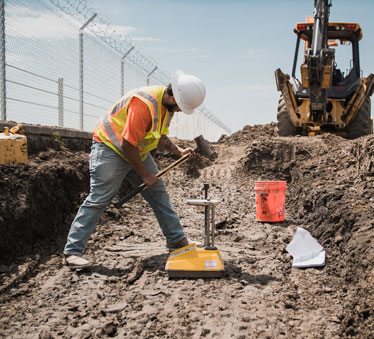Just How Geo Tech Engineering Supports Large-Scale Construction Projects
Just How Geo Tech Engineering Supports Large-Scale Construction Projects
Blog Article
A Thorough Review of the Trick Duties of Geotechnical Engineers in Site Characterization and Ground Renovation Methods for Engineering Solutions
Geotechnical engineers are essential to the successful execution of design projects, tasked with the crucial responsibilities of website characterization and the application of ground improvement techniques. Their job involves an extensive evaluation of subsurface problems, utilizing numerous screening methods to recognize dirt and rock buildings.
Function of Geotechnical Engineers
Geotechnical designers play a crucial duty in the design and building and construction of facilities by assessing the actions of soil and rock below the surface area - geo tech engineering. Their responsibilities incorporate evaluating subsurface problems to educate style decisions that ensure architectural security and safety. By carrying out detailed evaluations of dirt residential or commercial properties, consisting of shear stamina, leaks in the structure, and compressibility, geotechnical engineers supply important data that affects the option of ideal building products and techniques
Along with analyzing dirt mechanics, geotechnical designers are charged with determining possible threats such as landslides, sinkholes, and ground settlements. Their experience aids mitigate dangers linked with these geotechnical phenomena, consequently shielding both the setting and public security. They likewise work together closely with other design techniques, ensuring that geotechnical factors to consider are incorporated into total task layout.
Moreover, geotechnical engineers take part in the analysis of existing structures, offering suggestions for retrofitting and repairs when essential. Their detailed understanding of soil-structure interaction is necessary for the advancement of sustainable facilities services. In general, the duty of geotechnical engineers is essential to the successful realization of construction tasks, guaranteeing they are risk-free, long lasting, and certified with governing requirements.

Website Characterization Processes
Effective website characterization processes are necessary for understanding the subsurface conditions that influence project style and implementation. Geotechnical engineers employ a systematic approach to gather, assess, and analyze information concerning groundwater, dirt, and rock features. This process starts with a comprehensive review of existing literary works and historic website data, offering understandings into previous site problems and potential obstacles.

Data evaluation adheres to fieldwork, where engineers make use of geostatistical methods to interpret searchings for and create geological designs. This modeling help in determining prospective geohazards, such as landslides or liquefaction, which are crucial for threat assessment. Ultimately, the outcomes inform layout referrals, making sure that design remedies are both risk-free and effective. With attentive website characterization, geotechnical designers prepared for effective job execution, enhancing and lessening unexpected problems source allotment.
Soil and Rock Testing Techniques
While recognizing subsurface problems is critical, the selection of suitable dirt and rock testing techniques is similarly crucial for exact analysis and design. Geotechnical designers employ a selection of testing methods to assess the mechanical and physical homes of soil and rock products.
Research laboratory tests, such as Atterberg limitations, grain size evaluation, and unconfined compressive strength examinations, offer important information on soil habits under next various wetness problems and filling circumstances. These tests assist determine dirt category and anticipate settlement or shear strength characteristics crucial for structure style.
In-situ screening approaches, including Criterion Infiltration Tests (SPT), Cone Infiltration Examinations (CPT), and stress meter examinations, permit engineers to gather data directly from the ground. These approaches supply important insights into the soil's thickness, uniformity, and stratification without the demand for comprehensive tasting.
Rock screening normally involves core sampling and research laboratory analysis to assess properties like uniaxial compressive toughness and rock top quality designation (RQD) Together, these dirt and rock screening techniques allow geotechnical engineers to make informed choices pertaining to site-specific difficulties, ensuring the security and security of engineering remedies.
Ground Enhancement Techniques
Ground renovation strategies are essential for boosting the design properties of dirt, thereby increasing its load-bearing ability and decreasing settlement. These techniques are crucial in resolving obstacles presented by bothersome or weak soils, which can dramatically influence the security and longevity of structures.
Numerous ground improvement methods are utilized, consisting of compaction, grouting, and dirt stabilization. Grouting, on the various other hand, entails infusing a liquid material into the ground to load voids and enhance soil communication.
Soil stabilization incorporates a series of methods, from chemical additives to mechanical treatments, intended at enhancing the soil's resistance to disintegration and contortion. Methods such as lime stablizing or cement blending change the homes of the soil at a particle level, enhancing its overall performance.
Value of Geotechnical Evaluations
Geotechnical evaluations check my reference play an essential duty in the preparation and design of engineering tasks, as they supply vital information about the subsurface conditions. Recognizing soil properties, rock developments, groundwater levels, and possible geohazards is important for making certain the security and safety of frameworks. These assessments enable designers to make educated choices concerning website option, layout criteria, and construction methods.
The importance of geotechnical assessments expands past first task phases; they are crucial in danger administration and price efficiency. By determining prospective problems early, such as dirt settlement, slope instability, or excessive groundwater, designers can devise suitable reduction techniques, reducing the possibility of expensive hold-ups and architectural failures. These assessments sustain compliance with regulatory demands and enhance the sustainability of engineering practices.

Final Thought
Finally, geotechnical engineers are essential to making sure the safety and security and security of engineering jobs via extensive website characterization and ground renovation techniques. geotech engineer. Their methodical strategy to evaluating subsurface conditions, combined with their suggestions for reliable ground adjustment, significantly enhances soil residential or commercial properties and load-bearing capability. The know-how of geotechnical designers not just facilitates enlightened job preparation however also makes certain compliance with policies and fosters reliable interaction amongst stakeholders, ultimately adding to successful design end results
Geotechnical engineers play a pivotal function in the design and building of infrastructure by evaluating the behavior of soil and rock underneath the surface. By carrying out thorough evaluations of dirt residential properties, including shear compressibility, stamina, and leaks in the structure, geotechnical engineers supply important information that influences the selection of suitable building products and methods.
In enhancement to evaluating dirt technicians, geotechnical designers are charged with recognizing potential threats such as landslides, sinkholes, and ground negotiations. Geotechnical engineers employ an organized method to gather, examine, and translate data relating to dirt, rock, and groundwater attributes. By identifying prospective problems early, such as soil settlement, incline instability, or too much groundwater, designers can devise suitable reduction methods, decreasing the likelihood of pricey delays and structural failings.
Report this page